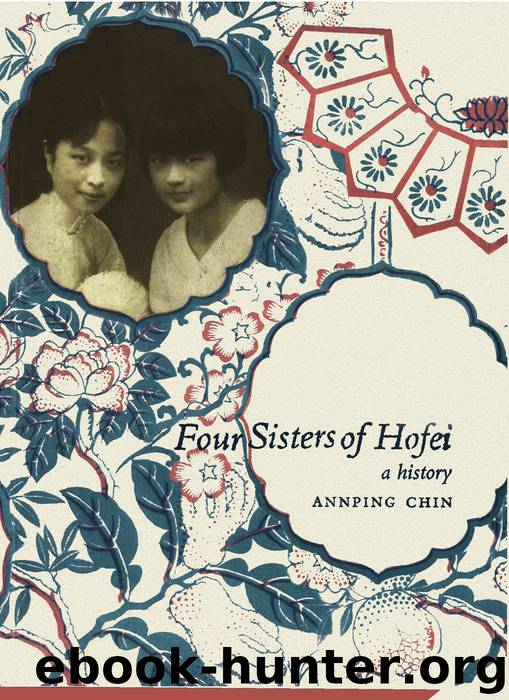Four Sisters of Hofei : A History (9781439125878) by Chin Annping

Author:Chin, Annping
Language: eng
Format: epub
Publisher: Simon & Schuster
YUN-HO
Yun-ho (left), with Yuan-ho, when she was a college student in Shanghai.
WHEN SHE WAS A CHILD, Yun-ho did not like love scenes in an opera, or scenes with sensitive young men. They put her to sleep. She preferred extreme characters, men who were violently brave and fiercely upright. The warrior Lord Kuan was her favorite.
In the Chinese imagination, everything about Lord Kuan was godlike—his appearance, his character, and his accomplishments. A protracted civil war at the end of the Han dynasty gave him a chance to be great; the storytellers filled in the rest. One account from the sixteenth century described him as “nine feet tall, with a long two-foot beard, and a face [red as] jujube. His lips are like painted rouge, with cinnabar phoenix eyes, and reclining silkworm brows.”
Yun-ho, at the age of five or six, was not afraid of Lord Kuan’s red face and long beard. They might have seemed strange and exaggerated, but it was a countenance so stern and forceful that it permitted no injustice or duplicity. One poet wrote: “His manly spirits had power like wind or thunder; / His glowing purpose shone like sun or moon.” It was this aspect of Lord Kuan that impressed Yun-ho. She also liked the mood of a drama with him in it, which was always religious and dignified because he was a god. The scene she loved best opens with the night after Lord Kuan was beheaded in the town of Mai. The vapor from Lord Kuan’s soul “remained undissolved, floating attenuated until it came to rest on Jade Springs Hill in Tangyang county, Ching-men-chou.” Yun-ho remembers the smell and sight of burning incense permeating the stage—Lord Kuan’s “undissolved soul.” “It was mysterious and full of foreboding,” she says.
The novel that inspired the opera continues:
On the hill lived an old monk whose Buddhist name was P’u-ching, or “Universal Purity.” He was the abbot of Cheng-kuo Temple at the Ssu River pass. In his jaunts through the realm, he had come to the mountain, and, attracted by its charmed scenery, had built himself a thatched shelter there. In this hermitage he would seat himself for meditation each day, searching for the truth of life. Besides himself was a single novice; they lived on the food they begged.
The night Lord Kuan died, the moon glowed pale and a breeze blew cool and fresh. Some time after the third watch, as the monk was sitting in meditation, a voice called out, “Return my head.” P’u-ching scrutinized the air. A man was riding the steed Red Hare and brandishing the sword Green Dragon. Two men were in his train, a general of fair complexion and a swarthy man with curling whiskers. Together the three alighted from a cloud onto the summit of Jade Springs Hill. P’u-ching realized that it was Lord Kuan and struck the door with a deer-tail whisk for protection against the spirit.
Lord Kuan appeals to the abbot: “I have met with calamity and am now dead. Please teach me how to find redemption.
Download
This site does not store any files on its server. We only index and link to content provided by other sites. Please contact the content providers to delete copyright contents if any and email us, we'll remove relevant links or contents immediately.
| China | India & South Asia |
| Japan |
Fanny Burney by Claire Harman(25792)
Empire of the Sikhs by Patwant Singh(22184)
Out of India by Michael Foss(16315)
Leonardo da Vinci by Walter Isaacson(11918)
Small Great Things by Jodi Picoult(6108)
The Six Wives Of Henry VIII (WOMEN IN HISTORY) by Fraser Antonia(4799)
The Wind in My Hair by Masih Alinejad(4427)
The Lonely City by Olivia Laing(4126)
The Crown by Robert Lacey(4114)
A Higher Loyalty: Truth, Lies, and Leadership by James Comey(4039)
The Iron Duke by The Iron Duke(3650)
Millionaire: The Philanderer, Gambler, and Duelist Who Invented Modern Finance by Janet Gleeson(3575)
Sticky Fingers by Joe Hagan(3456)
Alive: The Story of the Andes Survivors by Piers Paul Read(3320)
Papillon (English) by Henri Charrière(3279)
Joan of Arc by Mary Gordon(3270)
Stalin by Stephen Kotkin(3091)
Aleister Crowley: The Biography by Tobias Churton(3026)
Ants Among Elephants by Sujatha Gidla(2928)
